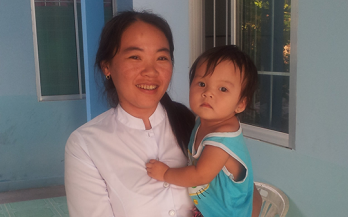- 02/11/2015
The objective of this study was to determine the association between breastfeeding practices, diet and physical activity and maternal postpartum weight. This was a secondary data analysis of a randomized community trial on beneficiaries of the Programa de Desarrollo Humano Oportunidades, recently renamed Prospera, without any diseases that could affect body weight.
- 11/01/2017
Accurate estimation of gestational age is important for both clinical and public health purposes. Estimates of gestational age using fetal ultrasound measurements are considered most accurate but are frequently unavailable in low- and middle-income countries. The objective of this study was to assess the validity of last menstrual period and Farr neonatal examination estimates of gestational age, compared to ultrasound estimates, in a large cohort of women in Vietnam.
- 01/09/2014
The purpose of this study is provide nationally representative data on the prevalence of anaemia, vitamin A and Fe deficiencies among pre-school age children (pre-SAC) and non-pregnant women of reproductive age (WRA), and on vitamin B12 and folate deficiencies in WRA, and the influence of inflammation on their interpretation.
- 07/06/2016
Docosahexanoic acid (DHA) is an important constituent of the brain. Evidence from well-designed intervention trials of the long-term benefits of increasing DHA intake during pregnancy has been sparse. This study evaluated global cognition, behavior, and attention at age 5 years in the offspring of Mexican women who participated in a randomized controlled trial of prenatal DHA supplementation.
- 16/05/2017
Poor adherence to micronutrient supplementation often limits the effectiveness of public health programs. The objective of this study was to describe the predictors of adherence to preconception and prenatal micronutrient supplementation among women participating in a randomized control trial in Vietnam.
- 09/03/2016
The WHO issued a strong recommendation that pregnant women be provided calcium supplements to prevent preeclampsia. This is the first recommended nutritional intervention to prevent this condition, a leading cause of maternal mortality globally. This article summarizes key evidence on a number of issues that require further clarification and guidance on calcium intake.
- 01/05/2015
The objective of this paper was to explore the perceptions of health providers and beneficiaries of the Oportunidades Program in Mexico about the practice of physical activity during pregnancy and postpartum, and to identify characteristics of the counseling on the subject in the first level of health care.
- 01/07/2018
Performance-based financing (PBF) directed at healthcare providers has shown potential to improve quantity and quality of maternal and child health services. This study implemented a longitudinal-controlled proof-of-concept PBF intervention at health facilities and with community-based associations focused on preventing vertical transmission of HIV (PVT) in rural Mozambique.
- 01/07/2016
The benefits of periconception folic acid (FA) supplementation in the prevention of neural tube defects is well recognized, but the evidence for preconception micronutrient interventions for improving pregnancy outcomes is limited. This study aimed to evaluate whether preconception supplementation with weekly iron and folic acid or multiple micronutrients improves birth outcomes compared with FA alone.
- 19/06/2015
The objective of this study was to assess the effects of prenatal home (point‐of‐use) fortification of foods with multiple micronutrient powders on maternal and newborn health.









